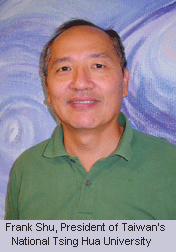|
News & Views item - June 2004 |
![]() Australian
National University Quality Review Update. (June 17, 2004)
Australian
National University Quality Review Update. (June 17, 2004)
TFW asked Ian Chubb, Vice-Chancellor, ANU how the review1,2 he had announced at the beginning of this year was progressing.
Preparations for the visit of Professor Derryck Schreuder and the Review Committee have progressed well. Students, alumni and stakeholders in the public and private sectors have been interviewed... [and] in the assessment of our research outputs, we now have over 300 assessors of international standing evaluating research in over 100 sub-discipline areas. In total over 4 500 research works will be assessed.
Professor Jeremy Knowles of Harvard and his moderating committee will examine these 300 reports, and report on them at an aggregated level to the Review Committee. Professor Knowles has already begun evaluating some materials for the review, in anticipation of the Review Committee’s arrival on the 19th of July.
The Committee consists of Professor Sir Colin Lucas (Vice-Chancellor of Oxford University), Professor Tom Everhart (former President of the California Institute of Technology), Professor Deborah Freund (Vice-Chancellor and Provost, Syracuse University), Dr Rita Colwell (Chair, Canon Life Science, former Director, National Science Foundation, Washington); Professor Franz Kuna (former Rector, Klagenfurt University, Austria), Ms Heather Ridout (Chief Executive, Australian Industry Group), Professor Frank Shu (President, National Tsing Hua University, Taiwan), Professor Wim Stokhof, (Director, International Institute of Asian Studies, Leiden University, The Netherlands), Professor Jan Veldhuis (former President, University of Utrecht, The Netherlands), and Professor Sir David Williams QC (Life Fellow, Emmanuel College, University of Cambridge).

Professor Shu trained at the Massachusetts Institute of Technology and Harvard University, he joined the Berkeley faculty in 1973 and in 1998 was named one of a handful of University Professors. But we single out Shu because he made the following comment to Science shortly before leaving to take over the university presidency to explain why:
I realized I can make a bigger difference in Taiwan than by remaining in the United States." But he admits he faces some significant challenges in raising the quality of Taiwan's universities. In addition to tapping private sources to supplement government funding, Shu also hopes to change a culture in which resources are shared equally to one in which academic stars receive the support they need to shine. "There is a growing understanding [among government officials] that science at the forefront is an elitist affair."
We hope that arrangements will be made to allow as many members of the review committee as possible to meet with influential political leaders and influential members of the media.